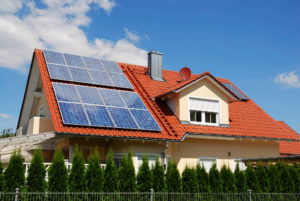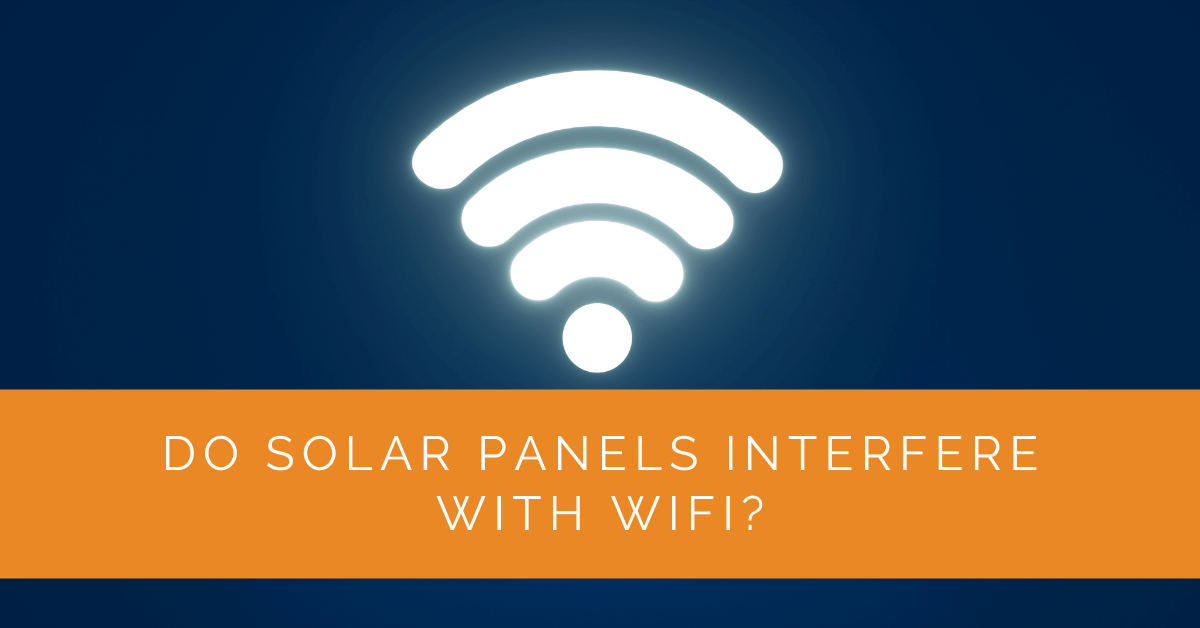With the rapid expansion of solar panel installations, questions regarding their potential interference with WiFi signals and cell phone reception have gained prominence. This comprehensive guide will delve deep into the intricate relationship between solar panels and signal interference, explore the factors contributing to disruptions, and present practical solutions to safeguard your connectivity and enjoy the benefits of sustainable energy.
Contents
- 1 Key Takeaways
- 2 Understanding the Potential Interference
- 3 Factors Contributing to Interference
- 4 Real-World Scenarios and Solutions
- 5 Case Study: Ensuring Seamless Connectivity
- 6 Expert Insights From Our Solar Panel Installers About Solar Panels Interfering with WiFi
- 7 Experience Solar Excellence with Us!
- 8 Conclusion
Key Takeaways
- Solar panels do not emit signals that interfere with WiFi or cell phone reception; instead, electromagnetic interference (EMI) is generated by components like inverters that may disrupt wireless signals.
- Preventive measures can mitigate potential interference issues, including proper inverter placement, sufficient distances, shielding and filters, and seeking professional installation.
- If you encounter connectivity problems after installing solar panels, consider solutions such as repositioning your router, upgrading to a high-quality router, using signal boosters or extenders, and consulting professionals to improve WiFi and cell phone reception.
Understanding the Potential Interference
Solar Panels and WiFi Signal Interference
Solar panels serve as an environmentally friendly means of harnessing solar energy. These panels, adorned with photovoltaic cells, convert sunlight into electricity, offering an eco-conscious alternative for power generation. However, as homeowners increasingly embrace solar energy, concerns have arisen about potential adverse effects on WiFi signal strength and reliability. To comprehensively address these concerns, it is essential to understand if and how solar panels can impact your WiFi connectivity.
Solar panels themselves do not emit signals that interfere with WiFi networks. Instead, the electronic components within your solar panel system, notably the inverter, play a pivotal role in this dynamic. The inverter can generate electromagnetic interference (EMI), potentially affecting nearby wireless devices, including your WiFi router.
Cell Phone Reception After Going Solar
In addition to WiFi concerns, the effects of solar panel installations on cell phone reception have also garnered attention. The same EMI generated by solar panel systems can interfere with cell tower signals, potentially reducing cellular connectivity within your home. Understanding these dynamics is crucial for ensuring a seamless transition to solar energy without compromising your wireless connectivity.
Factors Contributing to Interference
Electromagnetic Interference (EMI)
Electromagnetic Interference, or EMI, emerges as a primary source of signal disruption attributed to solar panels. The heart of the issue lies in the operation of solar inverters, which play a critical role in the solar panel system. These inverters convert the direct current (DC) electricity the panels generate into the alternating current (AC) used in your home. While inverters are essential for this transformation, they can emit EMI. This electromagnetic radiation can potentially disrupt nearby wireless signals, including those of your WiFi router and the signals from cell towers.
Preventing Solar Panel-Related Interference
To ensure that your solar panel system operates seamlessly alongside your WiFi and cell phone reception, several preventive measures can be taken:
- Inverter Placement: Opt for a high-quality inverter that complies with electromagnetic compatibility (EMC) standards. Proper placement and grounding of the inverter are crucial to minimize EMI emissions.
- Distance Matters: Pay careful attention to the distance between your solar panels, inverter, your WiFi router, and any cellular antennas or towers. Increasing the distance between these components reduces the likelihood of signal interference.
- Shielding and Filters: Explore using EMI shielding materials and filters, which can help contain and reduce electromagnetic interference. Consult a professional installer for guidance on suitable products for your specific setup.
- Professional Installation: Entrust your solar panel system’s installation to experienced professionals with the expertise to minimize interference issues. These experts can assess your property, identify potential interference sources, and implement the necessary precautions.

Real-World Scenarios and Solutions
WiFi Reception and Solar Panel Systems
In real-world scenarios, the impact of solar panels on WiFi reception can vary widely. Some homeowners report no noticeable interference, while others experience disruptions to their wireless networks. The variation arises from numerous factors, including the quality of your solar equipment, the distance between the inverter and your WiFi router, the layout of your home, and the presence of other electronic devices.
If you encounter WiFi connectivity issues after installing solar panels, consider the following solutions:
- Reposition Your Router: Experiment with different router placements within your home to identify the optimal position that minimizes interference from your solar panel system.
- Upgraded Router: Investing in a high-quality WiFi router with advanced features can enhance signal strength and resistance to interference.
- Signal Boosters and Extenders: Explore WiFi signal boosters or extenders, which can effectively increase coverage in areas affected by interference.
Cell Phone Reception After Solar Installation
The impact on cell phone reception following solar panel installation can similarly vary. While some users may not notice any significant difference, others may experience reduced signal strength, dropped calls, or disrupted data connectivity. Addressing these issues is essential to maintain seamless cellular communication.
Here are steps you can take to address cell phone reception issues:
- External Cellular Antennas: Consider installing an external cellular antenna, a signal booster, or a repeater to improve signal reception within your home.
- Signal Boosters and Amplifiers: Cellular signal boosters, often called signal amplifiers, enhance the strength and quality of your cell phone signal. These devices can be particularly effective in areas where cellular connectivity is weakened by interference.
- Consult a Professional: If cell phone reception challenges persist, it’s advisable to consult with a professional installer or your cellular service provider. They can offer tailored solutions to enhance your signal strength.
Case Study: Ensuring Seamless Connectivity
Background
At Solar Panels Network USA, we are committed to providing our clients with top-quality solar solutions that not only harness sustainable energy but also maintain seamless digital connectivity. This case study highlights our approach to addressing concerns about WiFi and cell phone signal interference caused by solar panel installations.
Project Overview
Our project aimed to install solar panel systems in a suburban neighborhood while ensuring that residents’ WiFi and cell phone reception remained unaffected. Given the rising concerns about electromagnetic interference (EMI) from solar inverters, we focused on implementing strategies to prevent any potential signal disruption.
Implementation
- Inverter Placement: We selected high-quality inverters that met stringent electromagnetic compatibility (EMC) standards. Proper placement and grounding of the inverters were prioritized to minimize EMI emissions. By strategically positioning the inverters away from WiFi routers and cellular antennas, we reduced the likelihood of interference.
- Distance Management: We paid careful attention to the distances between solar panels, inverters, WiFi routers, and cellular towers. Increasing the physical separation between these components helped mitigate potential signal disruptions.
- Shielding and Filters: To further contain and reduce electromagnetic interference, we used EMI shielding materials and filters. These materials were applied to the inverters and other electronic components to block any stray emissions that could affect wireless signals.
- Professional Installation: Our team of experienced installers assessed each property to identify potential sources of interference. They implemented necessary precautions and provided tailored solutions to ensure optimal system performance without compromising connectivity.
Results
- WiFi Signal Strength: Post-installation assessments showed that WiFi signal strength remained robust throughout the neighborhood. Residents reported no noticeable disruptions, even in homes with extensive solar setups. This success was attributed to the careful planning and professional installation of inverters and other components.
- Cell Phone Reception: Cell phone reception within the neighborhood also remained strong. By using external cellular antennas and signal boosters where necessary, we ensured that residents experienced consistent and reliable cell phone connectivity.
- Community Satisfaction: The project received positive feedback from the community. Residents appreciated the seamless integration of solar energy solutions without sacrificing their digital connectivity. The professional installation and preventive measures instilled confidence in the effectiveness of our approach.
Summary
Our project demonstrated that with careful planning and professional installation, solar panels can coexist harmoniously with WiFi and cell phone signals. By focusing on inverter placement, distance management, shielding, and the use of high-quality components, Solar Panels Network USA successfully addressed potential interference issues. This case study underscores the importance of a holistic approach to solar installations, ensuring that the benefits of sustainable energy are fully realized without compromising digital connectivity.
Expert Insights From Our Solar Panel Installers About Solar Panels Interfering with WiFi
Proper placement of inverters is crucial to minimize electromagnetic interference. By positioning them away from your WiFi router, you can significantly reduce the chances of signal disruption.
Senior Solar Installer
Using high-quality inverters that comply with EMC standards can prevent most interference issues. Investing in good equipment is essential for maintaining strong WiFi and cell phone signals.
Lead Solar Engineer
In our experience, professional installation is key to avoiding connectivity problems. Experts can identify and mitigate potential sources of interference during the setup process.
Solar Energy Consultant
Experience Solar Excellence with Us!
Trust in Solar Panels Network USA, where our seasoned experts deliver top-quality solar solutions for homes and businesses nationwide. With a legacy of countless successful installations and a commitment to sustainable energy, we’re your reliable partner in the solar journey. Ready for a brighter, eco-friendly future? Call us now at (855) 427-0058 and harness the power of the sun!
Conclusion
While concerns about solar panels interfering with WiFi and cell phone reception are valid, they can be effectively addressed with careful planning and professional installation. It’s important to note that solar panels do not emit signals directly affecting connectivity; instead, the electromagnetic interference generated by components like inverters may disrupt wireless signals.
By implementing preventive measures such as selecting a high-quality inverter, maintaining adequate distances, utilizing shielding and filters, and seeking professional guidance, you can ensure that your solar panel system coexists harmoniously with your WiFi and cell phone reception. These precautions allow you to fully embrace the benefits of solar energy without compromising your digital connectivity.
As you embark on your journey towards sustainable energy with solar panels, a well-executed installation will reduce your carbon footprint and keep you seamlessly connected to the digital world. In this article, we’ve addressed the concerns about signal interference from solar panels, provided insights into the factors contributing to interference, and offered practical solutions to ensure that your solar system enhances your home’s sustainability without compromising your connectivity.
About the Author
Solar Panels Network USA stands at the forefront of solar energy solutions, driven by a team of seasoned solar engineers and energy consultants. With over decades of experience in delivering high-quality solar installations and maintenance, we are committed to promoting sustainable energy through customer-centric, tailored solutions. Our articles reflect this commitment, crafted collaboratively by experts to provide accurate, up-to-date insights into solar technology, ensuring our readers are well-informed and empowered in their solar energy decisions.

